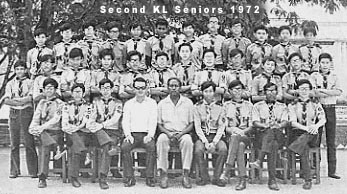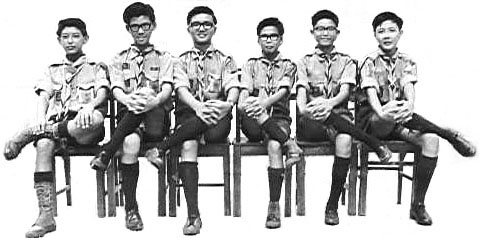 ince 1893, the V.I. and all its clubs, societies and uniformed
bodies had been subsumed under the state of Selangor. In 1974, a separate
Federal Territory of Kuala Lumpur was carved out of that state, and the V.I.
ceased to be known as "The Victoria Institution, Selangor". In the
ten years leading up to that event, the V.I. Scouts underwent one of its
most prodigious periods, as the V.I. went through its first decade under
Asian headmasters, beginning with the redoubtable Mr V. Murugasu in 1964.
The period was productive particularly in terms of producing Pengakap Raja.
There were also many changes; such as in 1967, the Scout Den moved from
the corner room (opposite the Sixth Form block) of the School to the jagaís
house opposite the V.I.O.B.A. and in 1968, the old khaki uniforms gave way to
the new grey uniforms that are still being worn in 2002. Equally importantly,
the period established many Scouting traditions that still continue to thrive
at the beginning of the 21st century.
ince 1893, the V.I. and all its clubs, societies and uniformed
bodies had been subsumed under the state of Selangor. In 1974, a separate
Federal Territory of Kuala Lumpur was carved out of that state, and the V.I.
ceased to be known as "The Victoria Institution, Selangor". In the
ten years leading up to that event, the V.I. Scouts underwent one of its
most prodigious periods, as the V.I. went through its first decade under
Asian headmasters, beginning with the redoubtable Mr V. Murugasu in 1964.
The period was productive particularly in terms of producing Pengakap Raja.
There were also many changes; such as in 1967, the Scout Den moved from
the corner room (opposite the Sixth Form block) of the School to the jagaís
house opposite the V.I.O.B.A. and in 1968, the old khaki uniforms gave way to
the new grey uniforms that are still being worn in 2002. Equally importantly,
the period established many Scouting traditions that still continue to thrive
at the beginning of the 21st century.
GROUP TRADITIONS - THE SYMBOLS AND THE ROUTINES
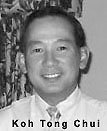
Symbols makes a group highly visible, and if accepted, the symbol becomes a tradition. One important tradition is the Group motto. The earliest appearance of the First KL motto ĎThe Fighting Firstí was to sign off the Scout report written by Koh Tong Chui in the Victorian 1963. It is unclear whether the phrase had then been accepted as the motto. However, the 1964 Senior Scout report, unequivocally records Ď....In accordance with our motto of the "Fighting First"....í. Thus, it must have been between those two years that ĎThe Fighting Firstí first entered into the psyche of First KL Scouts as their official dictum. Meanwhile, the Second KL motto made its first appearance a little later, in the 1966 Senior Scout report. Since then, ĎSecond To Noneí has been the rallying cry for the Group.

1966 was also an important year for Second KL traditions because the Second KL Group song was born. While there was hitherto a Group song composed by SM Chin Peng Lam in the early 1950ís, the song had been mostly forgotten by the mid-1960ís. Perceiving the need for a Group song, Ernest Yong Foo Yuen (V.I. 1961 - 1967, Second KL ASM and Pengakap Raja), mapped the following words to the inspiring tune of British Grenadiers:
Since nineteen hundred thirty three
Our glory has been high
The scouting spirit in our hearts
Will never fade and die
But of all the worldís hearty lads
Thereís none that can compare
With the Second KL Boy Scouts/ Seniors
Anytime and anywhere.
Over time, the penultimate line was changed to With the
Second KL Scout Group. (The song is often wrongly called the Troop Song.
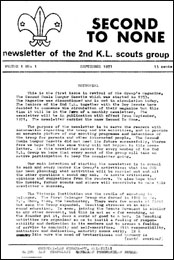 In fact, there are two Troops - Boy Scouts and Senior Scouts - but only
one Second KL Group. It is more correct to call it the Group song). Until
today, this Group song remains the rallying call of Second KL Scouts far
and wide.
In fact, there are two Troops - Boy Scouts and Senior Scouts - but only
one Second KL Group. It is more correct to call it the Group song). Until
today, this Group song remains the rallying call of Second KL Scouts far
and wide.
The revival of traditions was another undertaking of the Second KL Scouts. In 1953, a Group newsletter, Second KL Gazette was first published, but the venture folded after some unspecified time. A group of Seniors in 1971 decided to resurrect this useful conduit of information. So in September 1971 the Second KL Gazette was reborn as the Second To None newsletter, appearing quarterly. At that time, it was sold for a meagre 15 cents, and was published on cyclostyled F4 paper, with the first edition consisting of 15 pages. To the credit of the Second KL Group, this Second To None newsletter is still published, as of 2002, at least once a year.
In the 1960ís and the 1970ís, there was increasing dependence on the leadership of ASMís, due to a dearth of qualified and willing Scout Masters, a hangover phenomena from the mid 1950ís. In 1965, Mr T.J. Appaduray left the GSM-ship of the Second KL Scout Group after 10 years of service. The First KL GSM Mr Chan Bing Fai left one year later, in 1966, after 11 years in the job. No subsequent Group Scout Master of either the First or Second KL Scout Group has served as long as those two stalwarts. Since the 1960ís, the Scout Masterships of the V.I. Scouts have tended towards advisory capacities, except for occasional exceptions. While the label ĎTeacher Advisorí would have more appropriately described those teachers in charge of the Scouts, nevertheless the Groups persisted in using the terms Scout Master or Scout Mistress. Additionally, the change of SMís became more frequent, and as a result, SMís found no incentive to undergo training for Scouting credentials such as the Wood Badge. Indeed, the post of SM was no longer a coveted position, such that in 1968, Mr A. Jeyaretna was compelled to become GSM of both First and Second KL due to the shortage of willing volunteers!
INCREASED IMPORTANCE OF STUDENT LEADERSHIP
Student leaders thus became more pivotal in the V.I. Troops.
Formerly, the student leaders of both the Senior Scout and Boy Scout Troops were
called Assistant Scout Masters. In recognising their important role and to
distinguish the leaders of one Troop from the other, the Senior Troop student
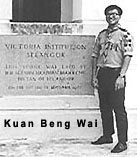 leaders were called Assistant Senior Scout Leaders while in the Boy Scout
Troop, the student leaders retained the ASM appellation. This change occurred
in First KL in 1965, with Koh Tong Chui and Chong Sze Foh being the first
ASSLís, while in Second KL, the change occurred in 1969, with Kuan Beng Wai,
Yong Yoon Shing and Shahul Hamid being the first ASSLís.
leaders were called Assistant Senior Scout Leaders while in the Boy Scout
Troop, the student leaders retained the ASM appellation. This change occurred
in First KL in 1965, with Koh Tong Chui and Chong Sze Foh being the first
ASSLís, while in Second KL, the change occurred in 1969, with Kuan Beng Wai,
Yong Yoon Shing and Shahul Hamid being the first ASSLís.
Those appointed to the posts were in the Sixth Forms, and hence would have been expected to possess a high degree of maturity and intelligence, not least knowledge of Scoutcraft. They had the ability to discharge two important roles namely to impart knowledge and to inspire their juniors. And those ASSLís and ASMís never shunned their duty, even though the temptation would have been to delegate their duties on to the Troop Leaders and Courts of Honour, while they lay back comfortably merely overseeing activities unfurl before them. During Saturday Troop Meetings, the ASMís taught Scoutcraft like pioneering, first aid, camping, tracking and singing to the Boy Scouts. As well, the ASMís led the Boy Scout Court of Honour in planning and preparing for Troop weekly meetings and major events like campfires or Troop Camps. On a cynical note, the ASMís also had a practical function for the Troops by their ability to drive and ferry people and equipment. In 1966, some Second KL Boy Scouts went to Penang and Langkawi aboard ASM Ernest Yongís Holden.
While there was more independence for the Senior Scouts, the ASSL post was still important because it required a higher competence in Scoutcraft. As well, the job carried more responsibility because Senior Scout events like Treasure Hunts and mountain climbing were more challenging to prepare for. For example, the Senior Treasure Hunt needed more cryptic clues, more detailed planning of times and longer routes, and more creativity in hiding the clues. In 1967, the end of the First KL Seniors Treasure Hunt required the Seniors to plunge into a mountain pool to retrieve the treasure!
While the Sixth Formers were strapped with the onerous ASSL and ASM posts, their juniors also had a taste of leadership when they became Patrol Leaders in the Boy Scout Troop and Senior Patrol Leaders in the Senior Scout Troop. The PLís formed the Boy Scout Court of Honour while the SPLís formed the Senior Court of Honour. They would meet regularly (fortnightly or weekly) to plan weekly activities for their Troops. Under the watchful supervision of the ASMís or ASSLís, it provided a mature forum to discuss problems, forward suggestions for the improvement of their Troop. The COH members were also entrusted with administering progressive tests for their boys. Such test-sessions were held regularly such as after Troop meetings or on weekdays. As well, the PLís and more Senior members would provide training in Scoutcraft to the Boy Scouts after school.
INCREASED ATTRACTIVENESS OF THE MOVEMENT
The period from 1964 to 1973 saw a dramatic increase in membership. The annual membership of First KL Boy Scouts between 1955 and 1963 hovered around 30 to 40 on average, but between 1964 and 1973, annual memberships of around 80 to 90 became the norm. Likewise, in Second KL, there were around 20 to 30 Boy Scouts each year between 1955 and 1963, but between 1964 to 1973, the figures averaged around 70. As a result of constantly changing membership, patrols were continually created and disbanded.
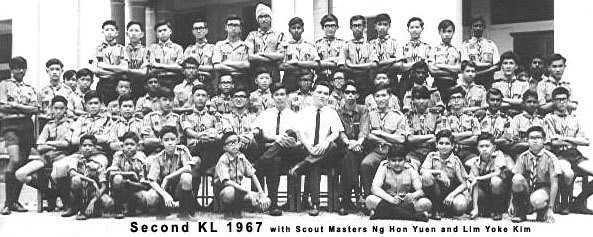
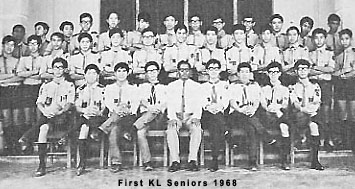
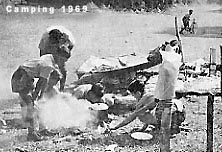 with each other, these camps were invariably held early during the First
term. Investitures were also held during these camps. Another important
camp (or camps) during the First term was the Training camp. The Training
camp provided a more intense experience for Scouts to learn, test,
experiment and refine their Scoutcraft ideas. These skills would then be put
to the ultimate test in the inter-patrol Competition camps (which started
in the 1950ís, according to the written records). Patrols were pitted against
each other in a strenuous camp that tested their Scoutcraft skills to the
utmost. Skills tested included pioneering, First-aid, rafting, backwoodsman
cooking (where all cooking utensils had to be crafted from jungle matter),
archery, underwater bamboo breathing and of course campcraft. For First KL,
their Competition camps were the culmination of an entire term of Scouting
competitions, including those held during ordinary Saturday Troop Meetings.
On the other hand, the Second KL Competition camps were free-standing
competitions.
with each other, these camps were invariably held early during the First
term. Investitures were also held during these camps. Another important
camp (or camps) during the First term was the Training camp. The Training
camp provided a more intense experience for Scouts to learn, test,
experiment and refine their Scoutcraft ideas. These skills would then be put
to the ultimate test in the inter-patrol Competition camps (which started
in the 1950ís, according to the written records). Patrols were pitted against
each other in a strenuous camp that tested their Scoutcraft skills to the
utmost. Skills tested included pioneering, First-aid, rafting, backwoodsman
cooking (where all cooking utensils had to be crafted from jungle matter),
archery, underwater bamboo breathing and of course campcraft. For First KL,
their Competition camps were the culmination of an entire term of Scouting
competitions, including those held during ordinary Saturday Troop Meetings.
On the other hand, the Second KL Competition camps were free-standing
competitions. 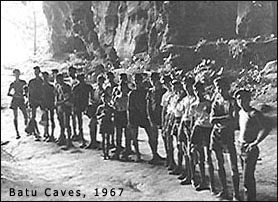
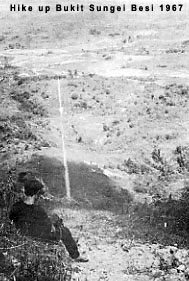 the Second KL Group outing to East Coast was certainly an eye-opening
experience for many who seldom travelled in that direction. They
camped at Teluk Cempedak Beach in Kuantan, visited a satellite station,
batik and silverware factories, and caught a boat to Pulau Kapas off
coast of Terengganu, before going to Sungai Golok and Rantau Panjang
on border for a glimpse of Thailand. For the Second KL Seniors, a more
intellectually stimulating agenda awaited them in 1973 when they
visited the Chemistry Department in 1973. There, they were enthralled
with presentations of toxicology, commercial chemistry and crime
detection (not to forget that in Scouting For Boys, Lord
Baden-Powell commends a certain Robert Hindmarsh who used his keen
senses to help detectives in solving a crime mystery).
the Second KL Group outing to East Coast was certainly an eye-opening
experience for many who seldom travelled in that direction. They
camped at Teluk Cempedak Beach in Kuantan, visited a satellite station,
batik and silverware factories, and caught a boat to Pulau Kapas off
coast of Terengganu, before going to Sungai Golok and Rantau Panjang
on border for a glimpse of Thailand. For the Second KL Seniors, a more
intellectually stimulating agenda awaited them in 1973 when they
visited the Chemistry Department in 1973. There, they were enthralled
with presentations of toxicology, commercial chemistry and crime
detection (not to forget that in Scouting For Boys, Lord
Baden-Powell commends a certain Robert Hindmarsh who used his keen
senses to help detectives in solving a crime mystery). 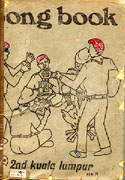 of songs and sketches, refreshments and displays, where parents could discover
the results of their sonsí involvement in the V.I. Scouting movement.
The first such campfire was on 2 June 1962, when First KL had theirs at
Castle Camp. It became an annual affair, except in 1965 when they had a
Gang Show instead, and in 1969, when the May 13 racial riots in Kuala Lumpur
forced the Group to cancel the event which was scheduled for May 17. There
were prizes presented to the best Boy Scout performance and the best Senior
performance, and one trophy ĎThe Plateí (donated by ASM Koh Tong Bak in 1963)
for the best overall performance. Second KL was soon to follow with a similar
tradition. Their first Annual Parentsí Campfire was on 30 May 1970 at Castle
Camp. The following year, a song book was produced which had 139 pages,
comprising 274 songs. Edited by then Pengakap Raja and ASSL Chong Kok Weng,
it was in high demand among Ranger Units, Girl Guide Coys and Scout Troops
around Kuala Lumpur. So they typed, cyclostyled and bound hundreds of them
and sold them for $1.00 each. In 1972, Second KL was presented
with a ĎBest Campfire Itemí trophy by Chan Lee Mun, the ASM for 1971.
Occasionally, the Campfires were marred by rain, such as the first three
First KL Campfires, but the Scouts kept whistling through the rain drops with
performances par excellence.
of songs and sketches, refreshments and displays, where parents could discover
the results of their sonsí involvement in the V.I. Scouting movement.
The first such campfire was on 2 June 1962, when First KL had theirs at
Castle Camp. It became an annual affair, except in 1965 when they had a
Gang Show instead, and in 1969, when the May 13 racial riots in Kuala Lumpur
forced the Group to cancel the event which was scheduled for May 17. There
were prizes presented to the best Boy Scout performance and the best Senior
performance, and one trophy ĎThe Plateí (donated by ASM Koh Tong Bak in 1963)
for the best overall performance. Second KL was soon to follow with a similar
tradition. Their first Annual Parentsí Campfire was on 30 May 1970 at Castle
Camp. The following year, a song book was produced which had 139 pages,
comprising 274 songs. Edited by then Pengakap Raja and ASSL Chong Kok Weng,
it was in high demand among Ranger Units, Girl Guide Coys and Scout Troops
around Kuala Lumpur. So they typed, cyclostyled and bound hundreds of them
and sold them for $1.00 each. In 1972, Second KL was presented
with a ĎBest Campfire Itemí trophy by Chan Lee Mun, the ASM for 1971.
Occasionally, the Campfires were marred by rain, such as the first three
First KL Campfires, but the Scouts kept whistling through the rain drops with
performances par excellence.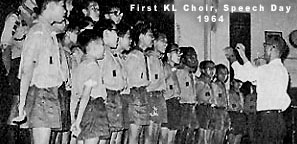 to raise funds in aid of the Scout Den Project. Though it was the first V.I.
presentation labelled a Gang Show, it was certainly not the first of its kind
as in 1953, there was a Fiesta Variety Show, which in essence was the same as
a Gang Show, but different in name. Apart from fund-raising, the Gang Show was
designed to foster understanding between the public and the Group as well as
reveal to the parents their sonsí activities and capabilities. Among the
performances was a choir that was ably trained and conducted by Mr Brian Percival,
a Peace Corps Volunteer. Many ex-Scouts also returned to lend a hand in that
event, which preparation caused the suspension of various activities like the
first term camp for the Seniors. The next Gang Show was held in March 1973 with
the theme ĎWhatís Up Scouts?í. It was organised by the ex-Seniors of First KL to
raise funds for the Groupís equipment. During the 1960ís, First KL also put up
many performances for the School Concerts. ĎThe Lifesaversí, a play depicting
the comical side of Scouting, was performed by the Seniors in 1966, followed by
a musical named ĎDown Calypso Wayí the next year.
to raise funds in aid of the Scout Den Project. Though it was the first V.I.
presentation labelled a Gang Show, it was certainly not the first of its kind
as in 1953, there was a Fiesta Variety Show, which in essence was the same as
a Gang Show, but different in name. Apart from fund-raising, the Gang Show was
designed to foster understanding between the public and the Group as well as
reveal to the parents their sonsí activities and capabilities. Among the
performances was a choir that was ably trained and conducted by Mr Brian Percival,
a Peace Corps Volunteer. Many ex-Scouts also returned to lend a hand in that
event, which preparation caused the suspension of various activities like the
first term camp for the Seniors. The next Gang Show was held in March 1973 with
the theme ĎWhatís Up Scouts?í. It was organised by the ex-Seniors of First KL to
raise funds for the Groupís equipment. During the 1960ís, First KL also put up
many performances for the School Concerts. ĎThe Lifesaversí, a play depicting
the comical side of Scouting, was performed by the Seniors in 1966, followed by
a musical named ĎDown Calypso Wayí the next year.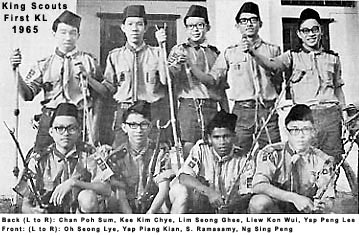 two being the awards immediately preceding the Cord and the Raja. In 1964, five
First Class, one Cord and three Raja holders were present in Second KL. In 1965,
First KL produced nine Rajas (Oh Seong Lye, Yap Piang Kian, Ramasamy, Ng Sing Peng,
Chan Poh Sum, Kee Kim Chye, Lim Seong Ghee, Liew Kon Wui and Yap Peng Lee). Meanwhile
in Second KL, PL Anthony Sun gained the Scout Cord and six held the Bushmanís Thong.
The next year, in 1966, five Second KL Scouts, namely, Patrick Ong Huat Leng, Victor
Sodhy, Ernest Yong, Edward Sun and Ronnie Khoo, were awarded with the Raja while TL
Ng Weng Kong gained the Scout Cord, joining Anthony Sun as a Cord holder. In 1967,
a number of First KL and Second KL Scouts passed the First Class badge to obtain
epaulettes while six Second KL Seniors gained the Bushmanís Thong. Two Second KL
Boy Scouts, Chong Kok Weng and Lee Kum Fook, obtained the Scout Cord.
two being the awards immediately preceding the Cord and the Raja. In 1964, five
First Class, one Cord and three Raja holders were present in Second KL. In 1965,
First KL produced nine Rajas (Oh Seong Lye, Yap Piang Kian, Ramasamy, Ng Sing Peng,
Chan Poh Sum, Kee Kim Chye, Lim Seong Ghee, Liew Kon Wui and Yap Peng Lee). Meanwhile
in Second KL, PL Anthony Sun gained the Scout Cord and six held the Bushmanís Thong.
The next year, in 1966, five Second KL Scouts, namely, Patrick Ong Huat Leng, Victor
Sodhy, Ernest Yong, Edward Sun and Ronnie Khoo, were awarded with the Raja while TL
Ng Weng Kong gained the Scout Cord, joining Anthony Sun as a Cord holder. In 1967,
a number of First KL and Second KL Scouts passed the First Class badge to obtain
epaulettes while six Second KL Seniors gained the Bushmanís Thong. Two Second KL
Boy Scouts, Chong Kok Weng and Lee Kum Fook, obtained the Scout Cord. 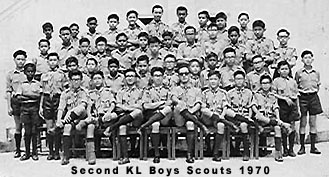
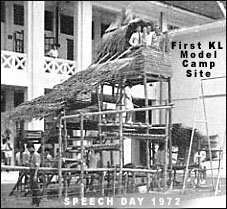 collections such as butterfly displays (catching and framing butterflies at
the Lake Gardens and elsewhere was a popular pastime among the Scouts then)
were also presented. For example, in 1966, the Second KL Seniors exhibited
scale models of pioneering projects, a life-sized signalling tower and aerial
runway, a patrol hut, butterfly displays, draw-it-yourself butterflies, and a
ĎTry Our Cookingí section. As well as these usual displays, the Scouts had
thematic displays that were unique to each Exhibition. In 1965, First KL had
a Red Indian theme, putting up a full-scale tepee, genuine arrowheads and
spearheads, live-sized Indians.
collections such as butterfly displays (catching and framing butterflies at
the Lake Gardens and elsewhere was a popular pastime among the Scouts then)
were also presented. For example, in 1966, the Second KL Seniors exhibited
scale models of pioneering projects, a life-sized signalling tower and aerial
runway, a patrol hut, butterfly displays, draw-it-yourself butterflies, and a
ĎTry Our Cookingí section. As well as these usual displays, the Scouts had
thematic displays that were unique to each Exhibition. In 1965, First KL had
a Red Indian theme, putting up a full-scale tepee, genuine arrowheads and
spearheads, live-sized Indians.